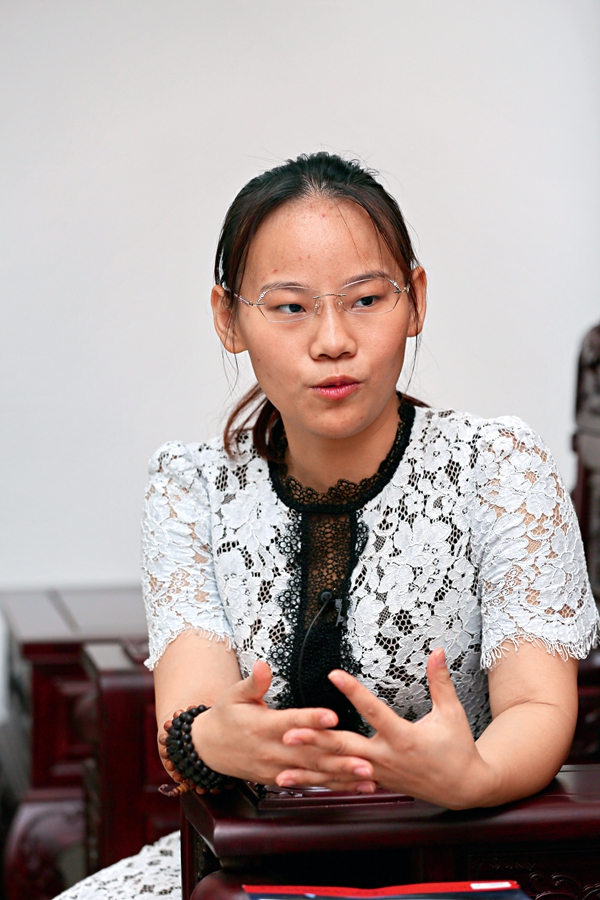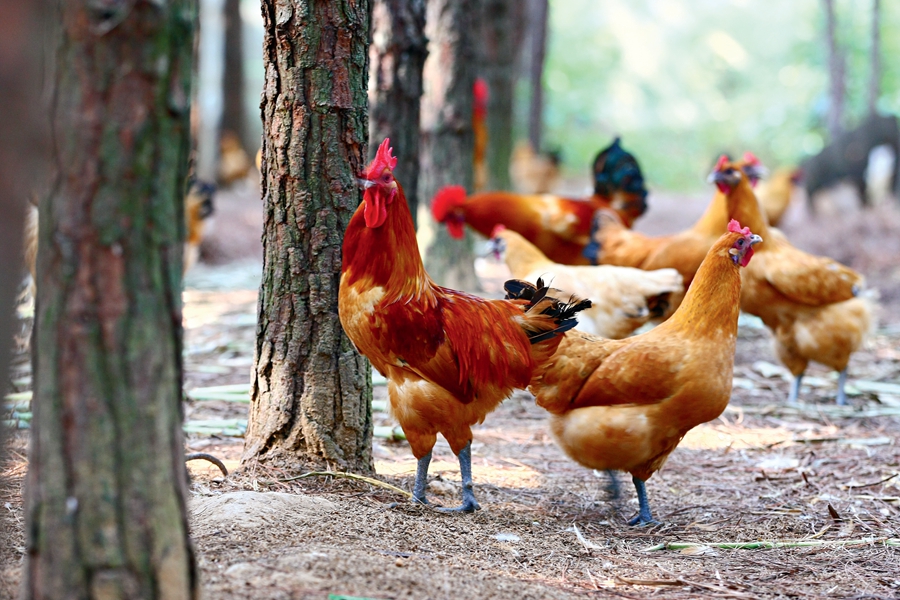AT nightfall, the sound of wings flapping can be heard in Longxin Organic Farm’s breeding base in Fuzhou City of Jiangxi Province. At the farm, millions of chickens leap on to pine trees. The scene is spectacular. These chickens roam the ground of the pine forest during the day, sleep on the pine trees at night, drink deep phreatic water, and eat pasture, pine needles and organic grains. This particular facility has 1,000 hectares of slash pine, which is managed by Fuzhou Longxin Ecological Breeding Co., Ltd. The founder Zhou Jing is a young graduate who returned to China after graduation to pursue green farming.
Just for Green Agriculture
Zhou was born in 1990 and studied at the University of Windsor in Canada. After graduation, she chose to go back to her hometown of Fuzhou, Jiangxi Province to start a business.

Zhou Jing, founder of Fuzhou Longxin Ecological Breeding Co., Ltd.
In her office, Zhou talked about the reasons for starting her own business. “When I studied abroad, I came across some foreigners holding prejudice against the quality and safety of China’s agricultural products. I want to use my own experience to create a green, organic agriculture and to change their views.” In fact, during her studies at the University of Windsor, Zhou tried to change the international image of China’s agricultural products. In May 2012, an international food exhibition was held in Montreal, Canada, in which Zhou actively promoted organic agricultural products from China and gained positive feedback.
It is Zhou’s dream to export more and more high-quality organic agricultural products to developed Western countries. “I wanted to chase my dream at home when I was still young,” said Zhou, “China now encourages mass entrepreneurship and innovation, my business has gained strong support from the agriculture and forestry department of the local government.”
The day of the interview happened to be the day before her marriage to her fiancé Li Lichao. Born in Shenzhen, 28-year-old Li was Zhou’s schoolmate at the University of Windsor. In 2013, many people couldn’t understand why the two returnees with master’s degrees wanted to raise chickens at Zhou’s hometown.
Zhou’s father is an entrepreneur in Fuzhou City, planting Chinese medicinal herbs, plants, and various trees. Her entrepreneurship would not be possible without her father’s support. Her father offered them a 1,000-hectare slash pine plantation to raise chicken. After years of arduous pioneering, their business is known far and wide.
Building a Trustworthy Brand
Walking in the wetland of slash pine, the breeze smells of pine needles. Countless chickens in this natural oxygen bar enjoy a free life in the green mountains and rivers.
The facility’s staff led us to walk around the pine forest, taking great care not to disturb the habitat. Those resting on trees are called “flying phoenixes,” while those roaming the forest floor are known as the “forest guarders.”

Workers in a henhouse look after chickens less than six-weeks-old.
Raising chickens is no simple task. There is no odor inside the chicken farm, because the company has good cooperation with the School of Life Sciences of Sun Yat-sen University to make full use of microbial fermentation technology. According to Zhou, each henhouse is paved with fermentation beds consisting of sawdust, rice husk, beneficial bacteria and other materials. When chickens paw the floor, chicken manure is turned over to the bottom of the fermentation bed, which will be fully fermented within two hours. Therefore, there is a hint of an aroma of ethanol inside the henhouse.
Under the guidance of university professors, an ecological cyclic system has been built up in the base. The chicken manure facilitated by rainwater is drained into artificial ponds, and a certain amount of the loaches and snails are put into the pond to purify the water quality. They also breed soft-shelled turtles to prey on the loaches and snails to maintain ecological balance. Water from the pond will be discharged into the reservoir, where freshwater fish there can purify water. Finally, the biologically purified water is used to irrigate the paddy rice in the facility.
In addition to Sun Yat-sen University, Zhou also cooperates with well-known domestic universities and research institutes such as Tsinghua University and Huazhong Agricultural University. By utilizing a special farming model that allows “pasture being planted in the woodlands, chicken raised under the forest, and fertilizing forests by manure based fermentation,” the outcome is healthy organic chickens, and thus the organic chicken named “Longxin Feitianfeng (flying phoenix)” is a trustworthy brand for consumers.

Free-range chickens stay in a pine forest for 100 days.
According to Zhou, the facility is divided into five sections based on the age of chickens. “We refer to them as ‘kindergarten’, ‘primary school’ and ‘middle school’. For chickens of six weeks, we will breed them in the pine forest,” said Zhou. While fast-growing chickens are available on the market in a month or two, our chickens are bred in the forest for about 100 days. Starting from the birth of chicks, the breeding time is from 135 to 180 days,” she said.
According to Zhou, the company obtained approval to sell poultry in Shanghai in July 2015, and later in September, the company signed a contract with the Shanghai Poultry Professional Cooperative and Shanghai Vegetable Group to sell one million chickens per year. The products enjoy booming sales in 20 provinces and municipalities nationwide. In 2016, the company raised three million chickens and realized an output value exceeding RMB 100 million. At present, the company has become the leading enterprise of agricultural industrialization in Jiangxi Province and won the gold award of the 17th China Green Food Exposition.
Shaking off Poverty with Green Farming
In order to expand the scale of breeding and enable more impoverished households to benefit from raising chickens and, at the same time, implement the policy of “involving the top 100 enterprises in targeted poverty alleviation” of the Fuzhou government, the company cooperated with Songhu Township in Linchuan District where Longxin Organic Farm is located. Via the business model of “company + base + farmer”, the company mobilized local farmers to breed “flying phoenix.”
According to Zhou, the company adopts the “five unifications” model to conduct targeted poverty alleviation. First is a unified supply-chain. The company provides 35-day-old vaccinated chickens (each about 250 grams in weight) to the farmers. Second, a unified feed supply. The company provides unified distribution of chicken feed to farmers according to the number of chickens they raise. Third, sufficient medicines and vaccinations. Based on the situation, the company technicians prescribe treatment and deliver veterinary drugs timely. Fourth, unified purchasing. For chickens with a breeding time of 100 days, and each weighing about 1.4 kg, the company will purchase them in time. Fifth, unified settlement plans. Within one week after collecting the chickens, a service fee of RMB 3 will be given to farmers for each chicken in time, and the company will give the village committee RMB 1 per chicken as the breeding site fee.
“The company provides free vaccinated baby chicks and technical guidance to the farmers, the village committee provides breeding sites, and the chickens will be exclusively purchased,” said Zhou, “in this way, each low-income family can earn around RMB 40,000 per year without capital investment.”
According to Wu Yingquan, a cadre at Fuzhou Municipal Agricultural Bureau, since rural infrastructure is weak, it is difficult to change the poverty situation of villages just by the government alone. The local government now makes overall arrangements and enables ecological agricultural projects. It’s a more effective poverty reduction approach to pool those special funds for agriculture, poverty alleviation, and transportation together and then invest them to those specific poverty relief projects via companies. They’re trying to help those impoverished people get rid of poverty successfully.
In 2017, the company expanded the number and range of farmers receiving their help. Up to August, it has signed assistance agreements with more than 1,100 poor people of 323 households.





